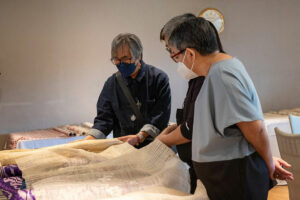HABI: The Philippine Textile Council invites piña and abaca weavers to showcase their skills in its two flagship competitions: the 7th Lourdes Montinola Piña Weaving Competition and the 3rd Eloisa Hizon-Gomez Abaca Weaving Competition. The competitions, which are part of HABI’s mission to preserve, promote, celebrate, and develop Philippine textiles and the country’s weaving culture, are among the highlights of the council’s annual Likhang Habi Fair which will be held on Oct. 18 to 20 at the Glorietta Activity Center in Makati.
Last year, Marilyn Almero of La Herminia Piña Weaving won two prizes at the 6th Lourdes Montinola Piña Competition for the excellence and innovation of her piece called Peacock. Aklan weavers Raquel Eliserio and Anna India Legazpi were first and second runner-up, respectively.
Winners of last year’s Eloisa Hizon-Gomez Abaca Weaving Competition were Anna India Legazpi, Agustin Tawi Sudaw of Bulacan, and Edgar Cornito, a T’Boli from Lake Sebu, South Cotabato.
This is the 7th edition of the Lourdes Montinola Piña Weaving Competition, the Philippines’ premier piña weaving contest, named after the chair emeritus of the Far Eastern University and author who is a champion of indigenous textiles. She has written several books including Piña, a landmark book about the origins, the history, and the artistry of the pineapple fiber cloth.
Artists and artisans who want to join the competition may work on their own or collaborate in creating extraordinary piña. Entries will be evaluated based on quality of making — excellence of the range of processes used including the knotting of the fiber, control over weaving tension, balance between the tensile strengths of piña and other fibers woven with the pineapple fiber, dyeing or other form of coloring, the physical relationship of the embellishments to the woven cloth and more — and quality of innovation and use of imagination.
The judges will be looking for freshness and excellence in the way they handle piña as a material. Blending with other natural fibers is allowed, as long as piña makes up more than 50% of the body of the cloth. Participants are encouraged to explore new possibilities for couture and experiment with new procedures in the making of pineapple fiber cloth. Submissions need to be at least two meters long. There is no regulation on the width.
Three winners will be chosen and ranked first, second, and third. “There will be special awards for young weavers under 30 years old and for outstanding innovation,” said Adelaida Lim, President emeritus of HABI.
Abaca weavers get their chance to shine in the Eloisa Hizon Gomez Abaca Weaving Competition. Ms. Lim said, “The abaca competition was initiated by the former fashion designer Gang Gomez, now Don Martin, OSB, and his siblings, to honor the memory of their mother who championed the wearing of native attires and use of local textiles.”
For the 3rd Eloisa Hizon-Gomez Abaca Weaving Competition, participants may also work on their own or collaborate with other artists in creating extraordinary abaca cloth. Submissions must be at least three meters long and woven exclusively using abaca fiber. The width is up to the contestants. Entries will be judged based on excellence in execution, skill and technique, including knotting and control of weaving tension, design and weaving qualities specific to the culture of the weaving community, aesthetics, dyeing or other forms of coloring and quality of innovation, if any.
Three exceptional pieces will be chosen and awarded equal prizes.
Entries must be packed with care and submitted to Habi: The Philippine Textile Council, Inc. Office at No. 962 May St., Mandaluyong City, Metro Manila. Entries must include a signed application form with the following details: title of work, name of weaver, age of weaver, indigenous group, mentor, address, weaving experience, how long it took to make the piece, description of the process and date. The deadline for submissions is on Sept. 16.
Interested parties may find out more about the competition mechanics by checking the council’s website habiphilippinetextilecouncil.com, and its social media pages on Facebook and Instagram (@HABICouncil). For more information, call HABI: The Philippine Textile Council at 0921-849-6974 or e-mail support@habiphilippinetextilecouncil.com.
